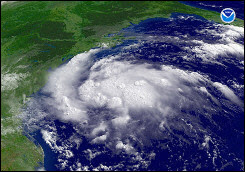
Shoppers stock up on supplies. See the survival kit below.
Damage done BEFORE the hurricane hits!
Hurricane Classification
Hurricanes are classified into five categories, based on their wind speeds and potential to cause damage.
Category One -- Winds 74-95 miles per hour
Category Two -- Winds 96-110 miles per hour
Category Three -- Winds 111-130 miles per hour
Category Four -- Winds 131-155 miles per hour
Category Five -- Winds greater than 155 miles per hour
In the U.S., the official hurricane season is from June 1 to November 30, but hurricanes can happen any time of the year. Hurricanes are named by the National Weather Service. Some previous ones have been named: Katrina, Opal, Andrew, Marilyn, Hugo and Fran.
Hurrican Dean
The hurricane, the first of the Atlantic summer season, has already killed at least six people including an 11-year-old boy struck by debris in the Dominican Republic, as it battered its way through the eastern Caribbean.
Apparently heading for a direct hit on Jamaica today, it has prompted the island government to issue a hurricane warning and begin moving people into hundreds of special shelters. An estimated 5,000 British tourists were preparing to huddle in hotel basements as the storm approached.
The storm, is set to pass directly over Jamaica at about mid-morning tomorrow local time, according to MeteoGroup, the weather division of the Press Association.
It is currently travelling at 18mph towards the island, with wind speeds of 150mph and gusts of up to 185mph.
The storm tore through St Lucia and Martinique yesterday leaving floods, debris and at least three deaths in its wake and forcing tourists to take refuge.
In the Cayman Islands, where the hurricane is expected late tomorrow or early Monday morning, the Government has announced that only Cayman nationals and residents can enter the islands until further notice
The US recommends the list below as a "Survival Kit". Can you think of anything else?
Food/Water
Bottled water - enough for 14 days
Manual can opener
Non-perishable foods:
Canned meat, fish, fruit and vegetables
Bread in moisture proof packaging
Cookies, candy, dried fruit
Canned soups, & milk
Powdered or single serve drinks
Cereal bars
Package condiments
Peanut butter and jelly
Instant coffee & tea
Torch(1 per person)
Portable battery powered lanterns
Glass enclosed candles
Battery powered radio or TV
Battery operated alarm clock
Extra batteries, including hearing aids
First Aid Kit-including aspirin, antibiotic cream, and antacids
Mosquito repellent
Sun screen
Waterproof matches/ lighter
Money
Plain bleach or water purification tablets
Disposable plates, glasses, and Utensils
Maps of the area with landmarks on it
Cooking :
Portable camp stove or grill
Stove fuel or charcoal, lighter fluid
Disposable eating utensils, plates & cups
Napkins & paper towels
Aluminum foil
Oven mitts
Personal Supplies:
Prescriptions ( 1month supply)
Toilet paper
Entertainment: books, magazines, card games etc
Soap and detergent
Toiletries
Bedding: pillows, sleeping bag
Clothing for a few days
Rain jacket, and work gloves
Extra glasses or contact lenses
Babies:
Disposable nappies
Formula, food and medication
Documents:
Medical information
Waterproof container for document storage
Back-up disks of your home computer files
Camera & film
Pet Supplies
Dry & canned food for two weeks
Water
Travelling Cage
Other Necessities:
Tools: hammer, wrenches, screw drivers, nails, saw
Rubbish bags (lots of them)
Cleaning supplies
Mosquito netting
fire extinguisher
tape
Outdoor extension cords
Spray paint to identify your home if necessary
One of your home phones















































